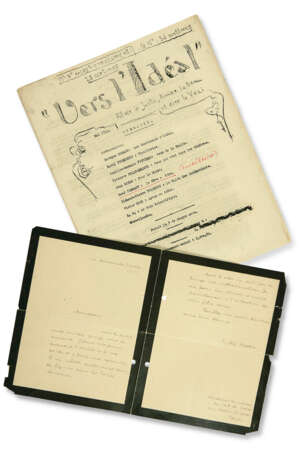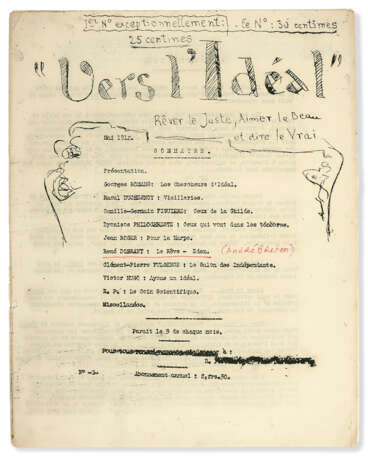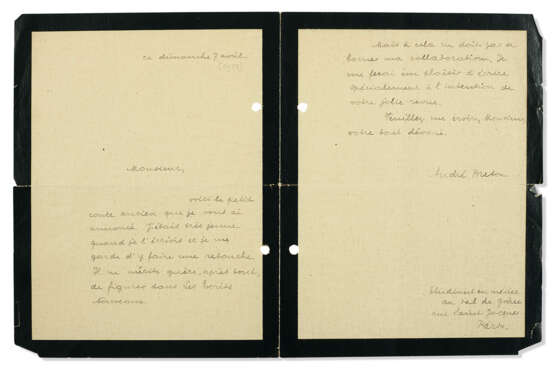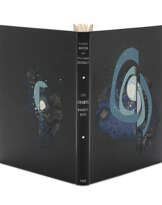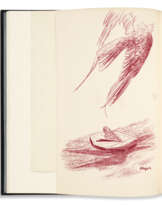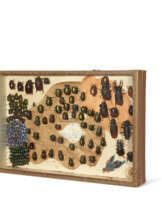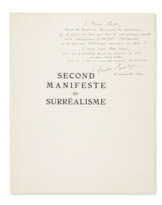ID 838042
Lot 4 | BRETON, André
Estimate value
€ 1 000 – 1 500
Vers l’Idéal. Revue.
Paris, mai 1912
RARISSIME REVUE DIRIGÉE PAR RENÉ HILSUM DANS LAQUELLE LE LYCÉEN ANDRÉ BRETON PUBLIE SES PREMIERS POÈMES, SEUL NUMÉRO PARU
EXEMPLAIRE EXCEPTIONNELLEMENT SIGNÉ
In-folio (281 x 220 mm), 14 pp. polygraphiées, signé à l'encre rouge sur la première page
Premier et unique numéro de cette revue des élèves du lycée Chaptal fréquenté par André Breton et Théodore Fraenkel et animée par René Hilsum, dans laquelle André Breton publie ses deux premiers poèmes : « Le rêve », daté de septembre 1911 et « Eden », daté d'avril 1912, tous deux signés de l'anagramme d'André Breton : René Dobrant.
Le second poème est dédié à Albert Keim, professeur de lettres d'André Breton qui exerça sur lui une grande influence littéraire.
Selon les rédacteurs du fonds André Breton conservé à la Bibliothèque Jacques Doucet : "Il n'existe pas de superlatif pour décrire la rareté de cette revue dont on ne connaît actuellement que 5 exemplaires". (www.andrebreton.fr)
[JOINT] : Lettre autographe signée à Maurice Martin du Gard directeur de la revue Les Écrits Nouveaux, datée "7 avril" 1918.
2 pp. sur un double feuillet demi-deuil (194 x 147 mm). Breton adresse à Maurice Martin du Gard un « petit conte ancien » qu’il publia, en 1912, dans « Vers l’Idéal », sous le pseudonyme anagrammique René Dobrant. Si le texte, comme le devine Breton, « ne mérite guère (…) de figurer dans les Écrits Nouveaux », il y publiera un premier poème « L’Or » dès le mois de juillet et sera un contributeur occasionnel de la revue
Rare copy of the review in which André Breton's first poems were published
| Artist: | André Breton (1896 - 1966) |
|---|---|
| Place of origin: | Western Europe, France, Europe |
| Auction house category: | Books |
| Artist: | André Breton (1896 - 1966) |
|---|---|
| Place of origin: | Western Europe, France, Europe |
| Auction house category: | Books |
| Address of auction |
CHRISTIE'S 8 King Street, St. James's SW1Y 6QT London United Kingdom | |
|---|---|---|
| Preview |
| |
| Phone | +44 (0)20 7839 9060 | |
| Buyer Premium | see on Website | |
| Conditions of purchase | Conditions of purchase |
